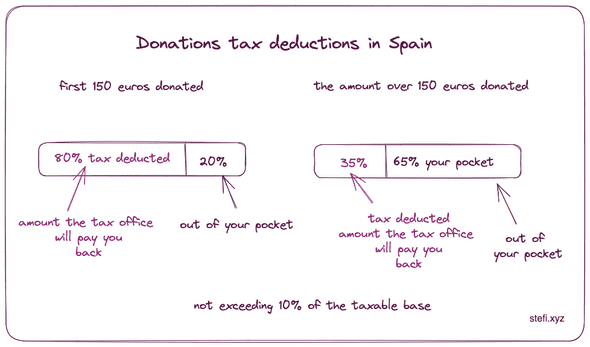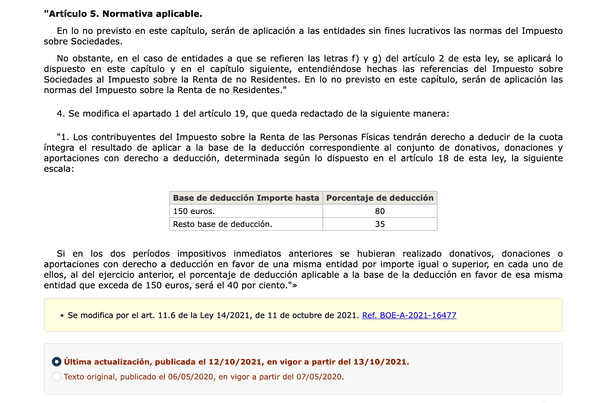💸 Rare financial advice: the power of giving back
December 02, 2023 • 3 min read
This year, I dedicated a significant amount of time to understanding personal finances as I wanted to know how to make the most of my savings and navigate different financial instruments. Along this path, I started reading Tony Robbins’s Unshakeable: Your Financial Freedom Playbook. Despite my initial reservations, I persevered and read it through, driven by the recommendation of someone I trust. This led me to discover an insight I haven’t found in the other resources I consumed (books, forums, courses etc.).
One key lesson that stood out was the importance of giving. Robbins quotes Winston Churchill:
“You make a living by what you get. You make a life by what you give.” - Winston Churchill:
Surprisingly, this aspect of generosity was largely absent in the financial literature I explored as well in the courses, videos or forums I was checking out. Most discussions revolved around making more money and optimizing investments.
This was exactly what I was focused on until I read Tony Robbins book, who emphasizes how people often delay the idea of giving, thinking they’ll do so when they have more. In the past, I shared this mindset, believing that charitable contributions were primarily the duty of wealthy individuals with substantial means. It never occurred to me to consider donations as a percentage of one’s income. I never thought that 🤯:
“If a person won’t give a dime out of a dollar they will never give $100,000 out of $1 million!” - Tony Robbins
Living in Romania, I discovered a straightforward way to contribute to non-profit organizations by redirecting 2% of my income tax. It was a simple process—pick an NGO, fill out a form, and done. On top of that this was money that otherwise would have gone to the state in form of tax.
Now living in Spain, I wasn’t initially aware of the tax-deduction options. Understanding the taxing system took some effort. For instance, donating 150 euros allows a 80% deduction, meaning that only 30 euros are paid out of pocket, the remaining 120 euros the tax office will pay you back. However, it’s important to keep in mind that the reimbursement process takes time, necessitating a tax declaration the following year. The reimbursement typically occurs a few weeks to months afterward. To illustrate, if you donated on the 2nd of December 2023, you’d complete your tax declaration around June 2024. Subsequently, a few weeks to a few months later (potentially by December 2024 in the worst case), you’ll receive your money back into your account. Of course, this assumes you don’t owe the state money due to any outstanding taxes.
I’m going to try my best to explain it: Since 2020, it’s possible to deduct up to 80% of the first 150 euros donated in the income tax return. Beyond this amount, the deduction percentages vary based on previous years’ contributions. However, there’s a maximum cap—deductions cannot exceed 10% of the taxable base of the tax.
This means that if I pay 1000€ per year in IRPF and donate 200€ per year, I can only deduct 100€ and not the previously mentioned 137.5€ or 150€. It is essential to provide the ID card (DNI or NIE) and address when donating so that the NGO can submit your information to the Tax Agency (Hacienda). Spanish NGOs offer simulators to estimate potential returns here is an example by the Arrels Fundació. If you donate to an NGO outside of Spain you’d need to send the donation certificate to your accountant when doing the tax declaration. I’m not very sure how that works it’s best to ask your accountant.
If you need some inspiration, this year, I chose to support various causes, including Men’s Health through my friend Abdon’s Movember campaign, the FEM Multiple Sclerosis Foundation through their campaign Mulla’t 2023, Arrels (assisting the homeless in Barcelona), Bancs de Aliments (food distribution) and the Enriqueta Villavecchia Private Foundation for Child Oncology. Each choice reflects my personal connections or concerns. I would have like to find a local organization supporting women facing abuse in Catalonia but it has proved challenging.
Update: As I couldn't find a specific organization supporting women facing abuse in Catalonia, I expanded my search and discovered the Fundacion Anabella based in Sevilla.With all this shared, remember, giving back is not only about money. Whether you contribute financially, volunteer your time ⌛, donate blood 🩸, or give clothes 👚 every effort counts when giving back.
Read More:
Stefi Rosca
👩💻 Frontend Developer, 🌍 traveler and⛷️ Skier
Recurse Center Alumn

